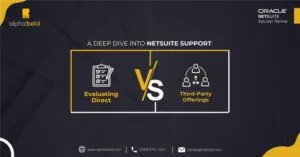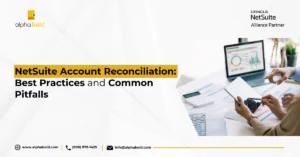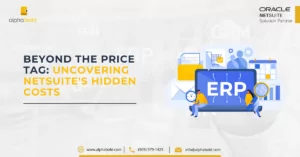Introduction
Since 2022, NetSuite boasted over 26,000 customer organizations, marking an impressive uptick from previous years and solidifying its spot as a frontrunner in ERP solutions.
Yet, for many enterprises, the journey with NetSuite begins with one crucial decision: licensing. With a handful of options to choose from and strategic financial considerations at play, getting your NetSuite licensing right from the outset can spell the difference between optimal performance and missed opportunities. Moreover, businesses that tailor their software licenses to their specific needs can significantly experience improvement in operational efficiency. This underscores the significance of understanding NetSuite licensing for effective financial planning and ensuring that the suite’s myriad capabilities are fully harnessed.
In this guide, we’ll better explore the intricacies of NetSuite licensing, offering insights to both newcomers and C-suite users alike. Whether you’re a small startup or a multinational enterprise, understanding NetSuite’s licensing model can provide clarity, drive cost savings, and propel your business toward greater heights.
NetSuite Licensing for Effective Financial Planning
Unlike traditional software purchases that require hefty upfront costs and periodic upgrades, NetSuite adopts a Software as a Service (SaaS) licensing model. This means that instead of purchasing the software outright, businesses subscribe to the service, typically on an annual basis. This subscription encompasses everything from the core platform to regular updates and sometimes even support.
The brilliance of the NetSuite licensing model lies in its flexibility. Companies can tailor their licenses based on their unique needs, ensuring they only pay for the functionalities they require. There are two primary components:
- User Licenses: These are determined by the number and type of users who will be accessing the system. The type of user (full access, read-only, etc.) can affect pricing.
- Module Licensing: NetSuite is modular, meaning businesses can select the specific modules they need – be it ERP, CRM, or e-commerce functionalities. This ensures companies aren’t saddled with unnecessary features that don’t align with their operations.
The SaaS model, combined with the tailored approach, allows businesses to forecast expenses more predictably, streamline operations, and adapt swiftly to changing business environments. Consequently, understanding and optimizing NetSuite licensing becomes a cornerstone for effective financial planning, empowering businesses to derive maximum value while minimizing waste.
In essence, NetSuite’s licensing model is not just about accessing a software platform; it’s a strategic endeavor that influences a company’s financial trajectory, operational efficiency, and overall growth potential.
Core Components of NetSuite Licensing
NetSuite licensing is the foundational framework that governs access to and utilization of this comprehensive cloud-based business management software suite. To effectively harness the power of NetSuite for your organization, it’s crucial to understand its multifaceted licensing model. This model encompasses several core components, each of which plays a pivotal role in shaping your NetSuite experience:
User Licenses:
- Full User License: This license provides complete access to all features and functionalities within NetSuite. Full users typically include employees who need comprehensive access to the system to perform their roles, such as finance professionals, salespeople, and managers.
- Employee User License: This is designed for users who primarily need to access employee-specific information, like timesheets, payroll, and HR data. It offers limited access to other parts of NetSuite.
- Self-Service User License: Intended for users who require self-service capabilities, such as submitting expense reports or managing their own profiles. They have very restricted access to other areas of NetSuite.
- Administrator User License: Reserved for users responsible for configuring, customizing, and managing the NetSuite environment. Admin users have broad system access to maintain and optimize the platform.
Module Licensing:
NetSuite offers a variety of modules that cater to different business needs. Businesses can choose which modules to license based on their requirements. Some key modules include:
- ERP (Enterprise Resource Planning): Core financials, inventory management, order management, procurement, and more.
- CRM (Customer Relationship Management): Sales automation, marketing automation, customer support, and case management.
- SuiteCommerce: E-commerce platform for online sales and customer engagement.
- HR (Human Resources): Employee management, payroll, and time tracking.
- Advanced Financials: Enhanced financial management capabilities.
- Business Intelligence: Reporting, analytics, and data visualization tools.
- SuiteAnalytics: Advanced reporting and analytics for in-depth data analysis.
- SuiteCloud: Development and customization tools for tailoring NetSuite to specific business needs.
Add-Ons and SuiteApps
- NetSuite offers a wide range of SuiteApps (third-party applications) and add-ons to extend the platform’s functionality. These can include industry-specific solutions, integrations with other software, and customization options.
Understanding these components and tailoring your NetSuite licensing to your organization’s specific needs is essential for optimizing costs and leveraging the full potential of the platform.
Let AlphaBOLD Help You Navigate the Complexities NetSuite
We understand that NetSuite is not an easy platform to navigate, so we are here to do it for you. Request a personalized demo today and see for yourself.
Request a DemoFactors Affecting NetSuite License Costs
- Number of Users: One of the most impactful factors affecting NetSuite license costs is the number of users requiring access to the platform. NetSuite offers different types of user licenses, each with its own pricing structure. It’s crucial to carefully assess your organization’s user needs and allocate the appropriate types of licenses. Over-licensing can result in unnecessary expenses, while under-licensing can lead to restricted functionality for your team members.
- Selected Modules: NetSuite’s modular structure is designed to cater to a wide range of business functions. The modules you choose to license can have a significant impact on your overall cost. Selecting only the modules that align with your specific business requirements can help control expenses. However, it’s important to strike the right balance to ensure your organization has access to the necessary tools and functionalities.
- Contract Duration: NetSuite licensing contracts are typically offered on an annual basis, but longer-term contracts, such as multi-year agreements, are also available. Choosing the right contract duration is a strategic decision that can affect your costs. Multi-year contracts may offer cost savings and price stability, while shorter-term contracts provide flexibility for businesses with evolving needs.
- Customizations and Add-ons: Businesses often require customizations or additional functionalities beyond NetSuite’s standard offering. Customizations can be both a cost driver and a value-add, depending on their scope and complexity. It’s important to evaluate the cost-effectiveness of customizations and explore alternatives like SuiteApps or integrations before embarking on significant customization projects.
- User Types and Roles: NetSuite provides various user types and roles, such as full-access users, read-only users, and self-service users. Understanding the roles and access levels required for each user in your organization is critical for optimizing license costs. Assigning the appropriate user types and roles can help you avoid overpaying for access that exceeds your users’ needs.
- Promotions and Discounts: NetSuite occasionally offers promotions, discounts, or bundle offers that can provide cost savings. Staying informed about these promotions and taking advantage of them when they align with your organization’s needs can result in significant cost benefits.
By carefully considering and managing these factors, businesses can ensure that their NetSuite licensing aligns with their operational needs while optimizing costs for maximum value. Regularly reviewing and adjusting licensing as your organization evolves is key to long-term cost-effectiveness and efficiency.

User Guide for NetSuite Pricing: All You Need to Know
All you need to know about NetSuite pricing! Explore our user guide for comprehensive insights.
Learn More
Understanding NetSuite Pricing Management Costs
Businesses of all sizes, from emerging startups to small and mid-sized enterprises, have found value in transitioning to NetSuite. It offers an efficient way to enhance your business operations, but what about the associated costs?
When you subscribe to NetSuite, you’ll incur an annual license fee. This license fee comprises three primary components:
Core Platform: This is the foundational component of your NetSuite license, providing access to essential features and functionalities.
Optional Modules: Depending on your business’s specific needs, you can opt for additional modules to enhance your NetSuite experience. These modules come at an extra cost.
Number of Users: NetSuite pricing also considers the number of users who will access the system. The more users you have, the higher the overall cost.
In addition to the annual license fee, there is a one-time implementation fee to cover the initial setup of NetSuite for your business. This fee ensures that your system is configured to meet your unique requirements and workflows.
One notable advantage of NetSuite’s cloud-based software is its scalability. As your business expands and evolves, you have the flexibility to activate new modules and add users seamlessly. This adaptability is a hallmark of cloud software solutions.
It’s important to note that NetSuite’s platform license includes order management capabilities, making it a comprehensive solution for businesses. For those with more complex order management needs, additional functionality is also available to further enhance your operations.
In conclusion, NetSuite pricing management is tailored to accommodate businesses of various sizes and needs. By understanding the components of the license fee and the scalability of the platform, you can make an informed decision about adopting NetSuite for your business.
Are you Considering Adopting NetSuite for your Business Operations?
Let's break down the NetSuite Pricing Management to provide you with a clearer picture.
Request a DemoCommon Pitfalls & Mistakes to Avoid
Effective NetSuite licensing isn’t just about gaining access to a software suite; it’s a strategic endeavor that influences financial planning, operational efficiency, and long-term growth. In this exploration, we’ll highlight the common pitfalls and provide practical solutions that empower businesses to navigate the complexities of NetSuite licensing with confidence and finesse.
Read more about “Why ERP Implementations Fail?” for more insights

1. Not Aligning Licensing with Business Growth and Change:
- The Pitfall: One of the most significant missteps is failing to align your NetSuite licensing with your business’s growth trajectory and changing needs. Over time, your organization may expand, diversify, or pivot its operations, and if your licensing remains static, it can lead to inefficiencies and underutilized resources.
- The Solution: Regularly reassess your licensing needs to ensure they align with your evolving business objectives. This includes conducting periodic reviews, considering your growth projections, and adjusting your licenses accordingly. By staying agile and adaptable, you can optimize your licensing to match your business’s current state and future aspirations.
2. Overcommitting Resources by Overbuying Licenses:
- The Pitfall: Many businesses, in a bid to ensure they have enough licenses for future growth, fall into the trap of overbuying licenses right from the start. This can result in significant unnecessary expenses, especially if growth projections don’t materialize as expected.
- The Solution: Adopt a measured and strategic approach to license acquisition. Begin with the licenses you need to operate efficiently in the present and consider the flexibility NetSuite offers for scaling up as your business expands. You can often add licenses as needed, avoiding upfront overcommitment and cost overruns.
3. Neglecting the Potential of Third-Party SuiteApps and Integrations
- The Pitfall: Focusing solely on NetSuite’s core modules can lead to missed opportunities for addressing specific business needs and enhancing your NetSuite experience. Neglecting the potential of third-party SuiteApps and integrations can limit your ability to optimize operations.
- The Solution: Explore the SuiteApp marketplace to identify third-party solutions that align with your requirements. These SuiteApps are often developed by specialists and can extend NetSuite’s functionality without extensive customizations. Additionally, consider integrating NetSuite with other software platforms your organization uses to ensure seamless data flow and efficiency across systems.
4. Failure to Monitor and Optimize Licensing Regularly:
- The Pitfall: Once you’ve established your initial NetSuite licensing, it’s easy to assume that the job is done. However, failing to monitor and optimize your licensing regularly can result in unnecessary costs and resource allocation issues.
- The Solution: Implement a proactive and consistent review process for your NetSuite licensing. This can be tied to annual budgeting cycles, major business changes, or growth milestones. By continuously evaluating your licensing needs, you can ensure that you’re not paying for access or functionalities that are no longer relevant.
5. Underestimating the Impact of Customizations:
- The Pitfall: While customizing NetSuite to suit your unique business workflows and requirements can be beneficial, it can also introduce additional costs if not managed carefully. Underestimating the impact of customizations, both in terms of budget and timeline, is a common mistake.
- The Solution: Conduct thorough assessments of customization needs, taking into account the complexity and scope of the changes. Establish a clear budget and timeline for customization projects and consider whether alternative configurations or SuiteApps can achieve your objectives without extensive customization.
Unlock the Full Potential of NetSuite for your Organization.
Don't leave your NetSuite journey to chance.
Request a DemoAvoiding these common pitfalls and embracing the recommended solutions empowers businesses to navigate the complexities of NetSuite licensing effectively, ensuring that the platform aligns seamlessly with their evolving business needs while optimizing costs and resource allocation.
Conclusion
NetSuite licensing isn’t just a matter of procuring software access; it’s a strategic endeavor that shapes financial planning, operational efficiency, and long-term growth. By regularly aligning your licensing with your business’s evolving needs, avoiding overcommitment, and tapping into the potential of third-party integrations and SuiteApps, you can maximize your NetSuite investment.
As you embark on your NetSuite licensing journey, remember that it’s not a one-time decision but an ongoing process. Regularly reassess your licensing strategy, optimize your resources, and stay agile to keep pace with your business’s evolution.
Explore Recent Blog Posts









